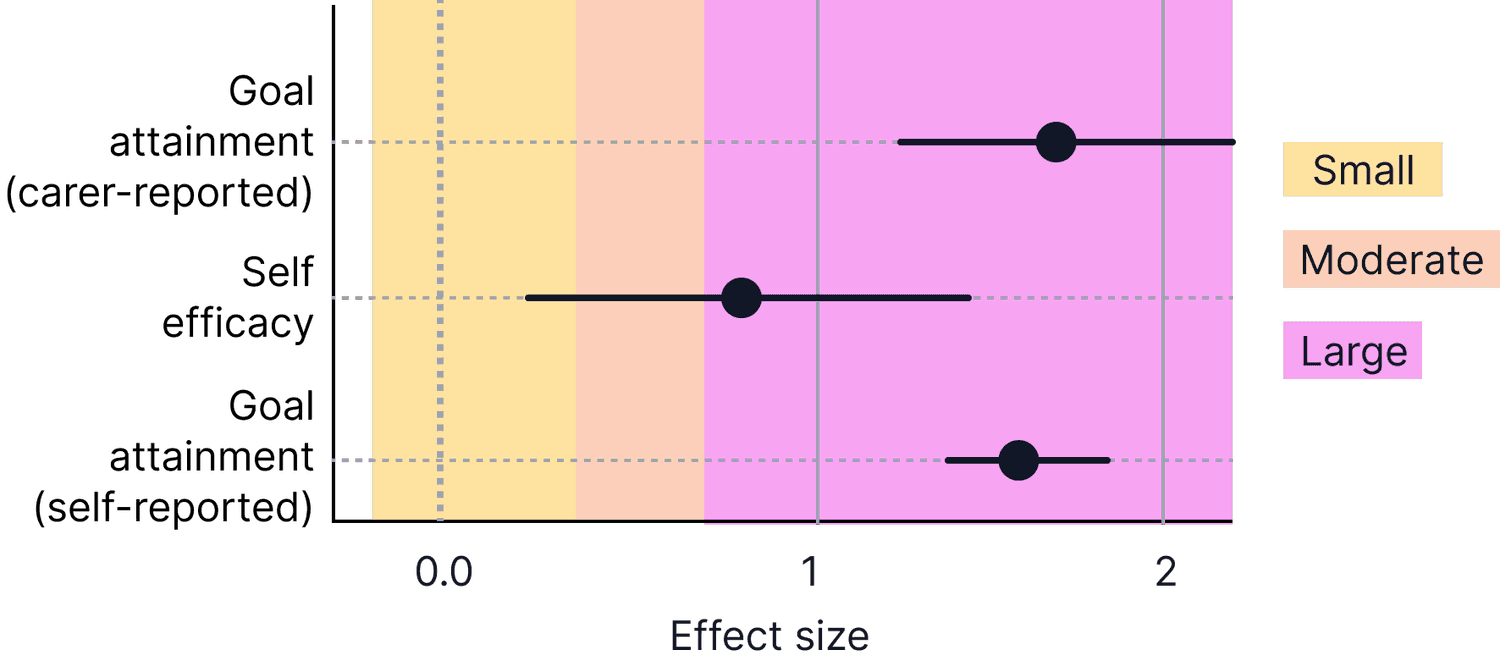The science behind NewDays
The evidence-based methods that inform treatments delivered by NewDays have been consistently supported in clinical trials as improving cognition, quality of life, and independence in people with mild cognitive impairment and dementia, and even delay symptoms of cognitive decline.

Our AI companion, Sunny, is trained on clinical research including the groundbreaking I-CONECT Study led by Dr. Hiroko Dodge of Harvard University. NewDays holds exclusive license to this protocol. For more information about the study see the science behind NewDays.

Our AI companion, Sunny, is trained on clinical research including the groundbreaking I-CONECT Study led by Dr. Hiroko Dodge of Harvard University. NewDays holds exclusive license to this protocol. For more information about the study see the science behind NewDays.

Our AI companion, Sunny, is trained on clinical research including the groundbreaking I-CONECT Study led by Dr. Hiroko Dodge of Harvard University. NewDays holds exclusive license to this protocol. For more information about the study see the science behind NewDays.
Recommended by
leading health organizations
The validated treatments informing the NewDays approach have gained recognition from major health organizations worldwide as the recommended standard of care for people living with mild cognitive impairment and dementia.
Recommended by
leading health organizations
The validated treatments informing the NewDays approach have gained recognition from major health organizations worldwide as the recommended standard of care for people living with mild cognitive impairment and dementia.
Recommended by leading health organizations
The validated treatments informing the NewDays approach have gained recognition from major health organizations worldwide as the recommended standard of care for people living with mild cognitive impairment and dementia.
Conversations and practice at the heart
Results from numerous clinical trials show three types of interventions, to be beneficial for people that face cognitive change. Each of them are based on having guided conversations.
Cognitive Rehabilitation
Cognitive Rehabilitation is considered the cognitive counterpart of physical rehabilitation.
Specific functional goals are set collaboratively between the person with dementia and the therapist.
In subsequent sessions, both work together to regain the ability to perform these activities using evidence-based strategies.
A standout trial involving 475 people with dementia tested 10 sessions of cognitive rehabilitation plus 4 booster sessions.
The trial showed that self-reported and carer-reported scores for goal-related activities nearly doubled.
This reablement-based approach shifted outcomes from “I can no longer do this” to “I can do this again.”

Meta-analysis11 of all the available clinical trial data for Cognitive Rehabilitation underscores the strong positive impact on self-efficacy and personal goal attainment - likely translating to increased confidence. Notably, caregivers also observed the improvement.
9. Clare, L. and Woods, R.T., 2004. Cognitive training and cognitive rehabilitation for people with early-stage Alzheimer's disease: A review. Neuropsychological rehabilitation, 14(4), pp.385-401.
10. Clare L, et al 2019.. Goal-oriented cognitive rehabilitation for early-stage Alzheimer's and related dementias: the GREAT RCT. Health Technol Assess. 2019 Mar;23(10):1-242. doi: 10.3310/hta23100. PMID: 30879470; PMCID: PMC6441850.
11. Kudlicka, A., et al. 2023. Cognitive rehabilitation for people with mild to moderate dementia. Cochrane Database of Systematic Reviews, (6).
Conversations and practice at the heart
Results from numerous clinical trials show three types of interventions, to be beneficial for people that face cognitive change. Each of them are based on having guided conversations.
Cognitive Rehabilitation
Cognitive Rehabilitation is considered the cognitive counterpart of physical rehabilitation.
Specific functional goals are set collaboratively between the person with dementia and the therapist.
In subsequent sessions, both work together to regain the ability to perform these activities using evidence-based strategies.
A standout trial involving 475 people with dementia tested 10 sessions of cognitive rehabilitation plus 4 booster sessions.
The trial showed that self-reported and carer-reported scores for goal-related activities nearly doubled.
This reablement-based approach shifted outcomes from “I can no longer do this” to “I can do this again.”

Meta-analysis11 of all the available clinical trial data for Cognitive Rehabilitation underscores the strong positive impact on self-efficacy and personal goal attainment - likely translating to increased confidence. Notably, caregivers also observed the improvement.
9. Clare, L. and Woods, R.T., 2004. Cognitive training and cognitive rehabilitation for people with early-stage Alzheimer's disease: A review. Neuropsychological rehabilitation, 14(4), pp.385-401.
10. Clare L, et al 2019.. Goal-oriented cognitive rehabilitation for early-stage Alzheimer's and related dementias: the GREAT RCT. Health Technol Assess. 2019 Mar;23(10):1-242. doi: 10.3310/hta23100. PMID: 30879470; PMCID: PMC6441850.
11. Kudlicka, A., et al. 2023. Cognitive rehabilitation for people with mild to moderate dementia. Cochrane Database of Systematic Reviews, (6).
Conversations and practice at the heart
Results from numerous clinical trials show three types of interventions, to be beneficial for people that face cognitive change. Each of them are based on having guided conversations.
Cognitive Rehabilitation
Cognitive Rehabilitation is considered the cognitive counterpart of physical rehabilitation.
Specific functional goals are set collaboratively between the person with dementia and the therapist.
In subsequent sessions, both work together to regain the ability to perform these activities using evidence-based strategies.
A standout trial involving 475 people with dementia tested 10 sessions of cognitive rehabilitation plus 4 booster sessions.
The trial showed that self-reported and carer-reported scores for goal-related activities nearly doubled.
This reablement-based approach shifted outcomes from “I can no longer do this” to “I can do this again.”

Meta-analysis11 of all the available clinical trial data for Cognitive Rehabilitation underscores the strong positive impact on self-efficacy and personal goal attainment - likely translating to increased confidence. Notably, caregivers also observed the improvement.
9. Clare, L. and Woods, R.T., 2004. Cognitive training and cognitive rehabilitation for people with early-stage Alzheimer's disease: A review. Neuropsychological rehabilitation, 14(4), pp.385-401.
10. Clare L, et al 2019.. Goal-oriented cognitive rehabilitation for early-stage Alzheimer's and related dementias: the GREAT RCT. Health Technol Assess. 2019 Mar;23(10):1-242. doi: 10.3310/hta23100. PMID: 30879470; PMCID: PMC6441850.
11. Kudlicka, A., et al. 2023. Cognitive rehabilitation for people with mild to moderate dementia. Cochrane Database of Systematic Reviews, (6).
Ready to get answers?
Schedule your free consultation with a NewDays clinician this week.
Available Monday-Friday via secure video call.








